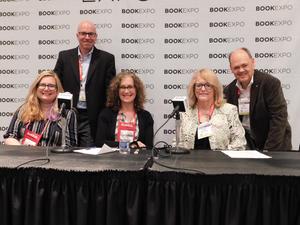So much happens at a book conference or trade show. For me, keeping a digital commonplace book has become a personal as well as professional habit. Long after a BookExpo or Winter Institute or fall regional bookseller conference has ended, I want to be able to call up quotable moments that could easily have slipped away, memory (mine at least) being the sieve it is.
This is particularly true of the education sessions, where attendees participate in detailed conversations about pertinent topics. There are so many excellent "big picture" takeaway quotes from these sessions, offering perspective on this crazy business we've all signed up for. Ya gotta save some of them.
 |
|
|
Andrea Kiliany Thatcher, Mike Onorato, Lynn Rosen, Megan Edwards, Mark Sedenquist |
|
Consider, for example, the BookExpo education session "Making Indie Bookstore and Library Events a Win-Win-Win," which was moderated by Mike Onorato, executive director of publicity at Smith Publicity, and featured Lynn Rosen, co-owner of Open Book Bookstore, Elkins Park, Pa.; Megan Edwards, author of the Copper Black mystery series; Mark Sedenquist, publisher of indie press Imbrifex Books; and Andrea Kiliany Thatcher, marketing manager & book publicist at Smith Publicity.
While the discussion leaned more toward bookshops than libraries, some excellent points were made about hosting author events, including:
Sedenquist noted that Imbrifex authors are advised "that when they go to book events we want them to introduce themselves to as many booksellers as possible. So that for nonfiction books, they're recognized as an expert in the field.... If they're a fiction writer, their personality should be apparent because those booksellers will handsell the books long after the author is gone."
Although selling her books is "always at the back of my head," Edwards conceded that "I can't just walk into a room and say that's what I'm there for. Perhaps it's obvious to everyone, but I do like getting to know people, meeting people who already know about and like my books and interacting with them. And I love getting to know booksellers and actually these days just visiting independent bookstores and chain bookstores all over the country is just a delightful way to be a tourist."
She also put in a plug for her home indie in Las Vegas: "We have a fabulous independent bookstore that has become a tourist destination. You wouldn't think that Las Vegas would be a place where readers would come, but this store is really worth the visit. It's called the Writer's Block.... So I really like all of that interaction, and then of course the residual effect afterwards of my books selling better and in more places across the country, which builds on itself. If I've done a good job, maybe I'll get invited back for the next one."
Speaking as a bookseller, Rosen agreed with Edwards that book sales are an important part of author events, but not everything: "We like to think of ourselves as creating conversations and community around the books. So if we're creating an atmosphere, if we're bringing people in, and they're enjoying something and they're part of a literary activity then we feel like we've accomplished what we set out to do. We're always balancing an event with book sales versus an event that's sort of a marketing tool; that's just getting new customers into the store, even if they're not buying something that night."
As a former social media manager for two indie bookstores in the Philadelphia area, Smith Publicity's Thatcher said she "felt that the social media content--newsletter content, website content--that you get from an event can be worth the event even if you only sold five or 10 books. There is some cynicism around author signing events. People are questioning that a lot, and I like to point out that there is the national reach of that hashtag for your book. That if you are promoting the signing the best you can online and in social media, the reach is much wider than just that city where you're hosting the event."
The big question had to be asked: What if an event happens and nobody shows up?
"I'm always so afraid I'm going to go and there'll be nobody there," Edwards confessed. "And it has never happened, but I will say that one time there were two people there. But that's okay with me. It's still an event. And you might modify how you present everything or interact with the two people who are there, but you can still have a great event. And it can still achieve all the other things that can go with a great event even if the room isn't full."
Thatcher said she loved "hearing an author say that it is their responsibility to get people there. As a bookseller and also as a publicist, I've had a lot of authors feel like that's perhaps someone else's job. I try to give them the perspective that the bookstore is doing you a favor. They're hosting you in their space. They're doing a lot of marketing, but we like you to do an equal amount of marketing."
Rosen posed some questions of her own: "What's in an event for the potential attendee? What do you have to offer them? For me, that's really important in planning our events.... So I try to think about what people want. Way back when I was an editor at Ballantine, my boss said, 'People don't buy books because they need them. They because they want them.' So I want to think about what people want out of our events."

